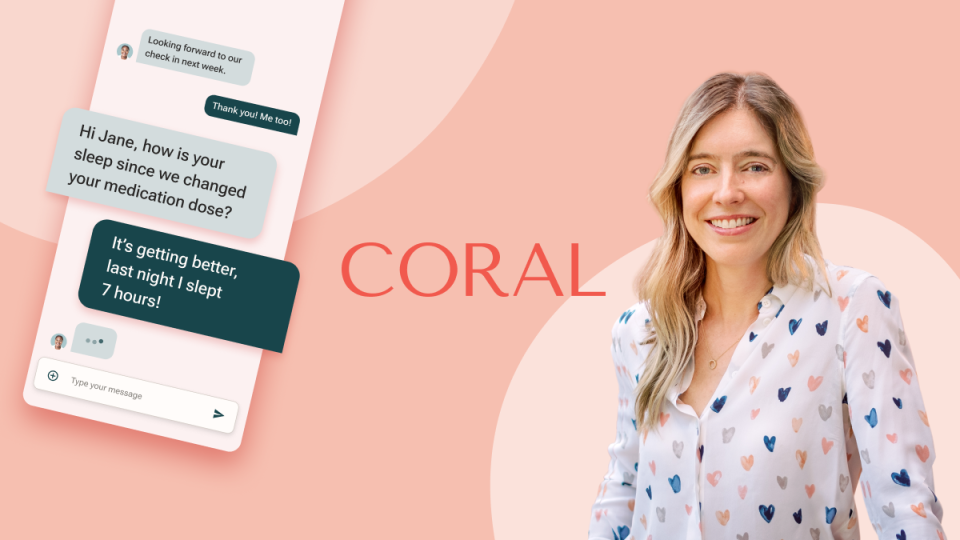Dr. Ariane Ouellet-Decoste
Medical Director at Coral
Menopause is a natural transition in a woman’s life, yet too often it’s treated as a stage to endure rather than one to approach with confidence and proactive support.

In this Q&A, Dr. Ariane Ouellet-Decoste, Medical Director at Coral, shares her insights on how evidence-based medical treatments and lifestyle strategies can work together to help women feel better today and protect their long-term health.

What exactly is menopause, and when does it typically occur?
Menopause is defined as the point when a woman has gone 12 consecutive months without a period, at the typical age range. On average, this happens around age 51, but it can occur earlier or later. If it happens before age 45, we call it early menopause. Before age 40, it’s considered premature menopause and requires more specialized medical care. Menopause can also occur earlier due to chemotherapy or surgery.

How is perimenopause different from menopause?
Perimenopause is the transitional phase leading up to menopause, and it can last anywhere from 4 to 8 years, sometimes even up to 10. This is often the most chaotic time hormonally, as estrogen and progesterone levels fluctuate dramatically. Women may experience irregular cycles, mood changes, and a range of physical symptoms long before their final period.

What are the most common symptoms women experience during this transition?
Hot flashes and night sweats are among the most well-known. But women also often report sleep disturbances, brain fog, anxiety, mood changes, and vaginal dryness. Importantly, some symptoms fade after menopause, while others, like bone health issues or genitourinary symptoms, can persist if not addressed.
Beyond these well-known symptoms, it’s also important to recognize the metabolic changes that occur during this stage of life. Shifts in hormones like cortisol, thyroid, and insulin can influence how the body processes energy, with insulin resistance often starting to increase. These changes can affect weight, cardiovascular risk, and overall energy levels, which is why addressing metabolic health alongside estrogen and progesterone is essential.

How can women manage these symptoms?
There are two major pillars: medical and lifestyle. Medical interventions include hormone therapy, which can be very effective when appropriate, as well as non-hormonal treatments. Lifestyle interventions are equally important. Regular exercise, good nutrition, stress management, sleep hygiene, and social connection all play a role in reducing symptoms and improving long-term health. At Coral, we emphasize an integrated approach combining evidence-based medical treatments and lifestyle adjustments.

Why is it important to seek care and support during this stage of life?
Because menopause isn’t just about symptoms today, it sets the stage for long-term health. This is the time when risks for heart disease, osteoporosis, and cognitive changes can increase. “Addressing menopause proactively, with evidence-based guidance, helps women not only feel better now but also protect their health for decades to come.”

How does Coral support women through menopause?
Coral is a virtual perimenopause and menopause platform designed to provide accessible, evidence-based care. We create personalized treatment paths rooted in science and combine medical interventions with lifestyle coaching. Our goal is to empower women with the tools and support they need to navigate this transition and thrive in the years that follow.
About Dr. Ariane Ouellet-Decoste
Dr. Ariane Ouellet-Decoste is a Canadian-trained physician with nearly two decades of clinical experience spanning emergency care, preventative medicine, and women’s health. Her expertise bridges traditional medical practice and evidence-based innovative approaches, with a strong focus on menopause, cardiometabolic health, and lifestyle-driven care.
After nearly 15 years practicing emergency medicine in Quebec and the UK, Dr. Ouellet-Decoste transitioned her focus to preventative and lifestyle medicine. She has since trained extensively in women’s health—including advanced courses from The Menopause Society, The Canadian Menopause Society and The British Menopause Society—and holds a postgraduate certificate in Nutrition Science from Stanford School of Medicine.
Dr. Ouellet-Decoste is an active member of the British Society of Lifestyle Medicine, the European Society of Preventive Cardiology, and is working in collaboration with the EPIC Centre (prevention Centre of the Montreal Heart Institute), where she implements cardiovascular disease prevention and reversal through lifestyle medicine. Her approach is rooted in applying the latest medical and nutritional science to support women through midlife transitions, including perimenopause and menopause.
Currently, Dr. Ouellet-Decoste serves as Medical Director at Coral, a virtual women’s health clinic specializing in menopause care. She is responsible for the medical quality and regulatory compliance of all clinical protocols, guiding Coral’s care team and clinical programs across geographies. She ensures high standards of care rooted in current evidence and clinical rigor.
Learn more about Coral.




